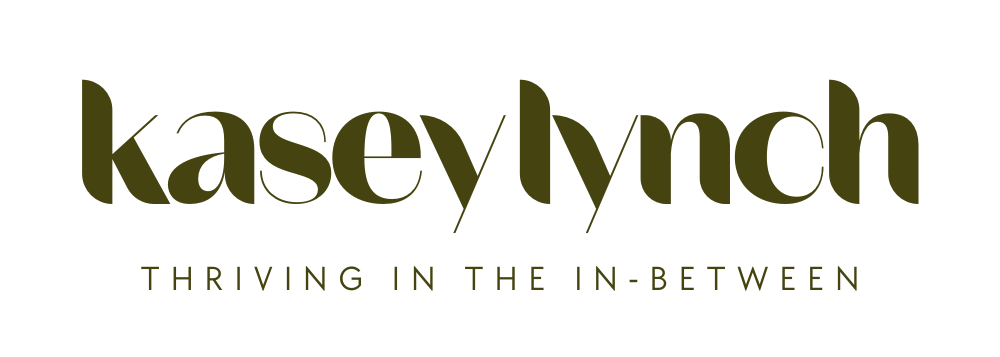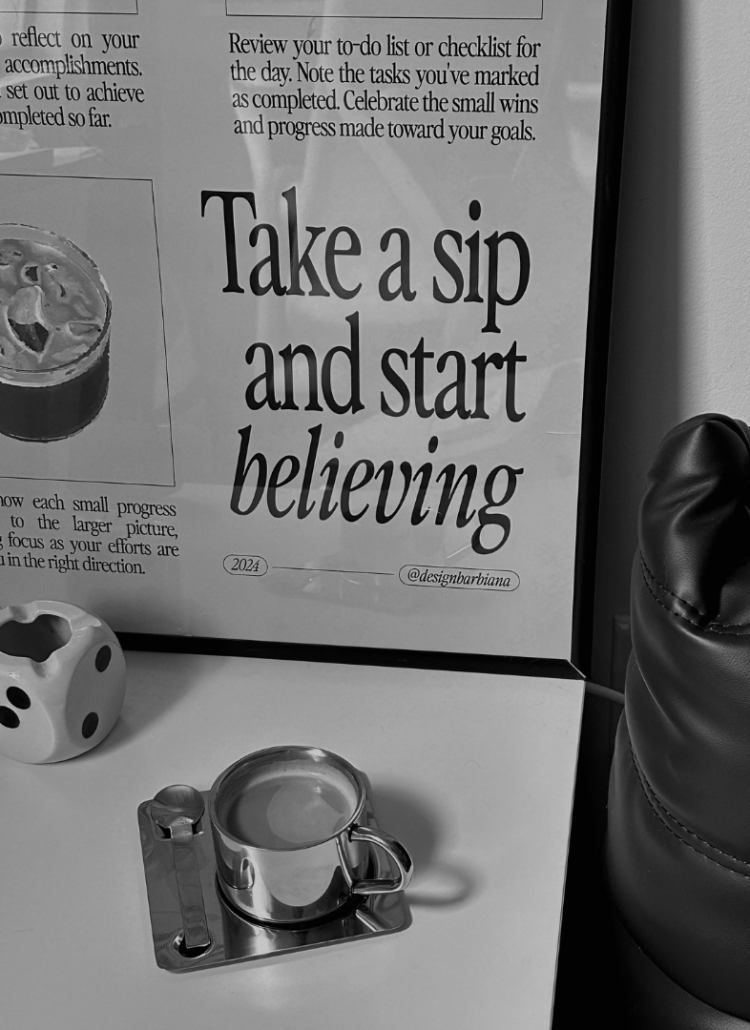Last Updated on 5 months ago by Kasey Lynch
Chances are, you’ve lost trust in yourself. Maybe not all at once, but little by little — by breaking promises to yourself, staying in relationships you swore you’d never tolerate again, or spending Friday nights with people who don’t have your best interests at heart just to avoid feeling alone.
These decisions may seem small, but over time, they chip away at your self-trust, eroding the foundation of your confidence. And when your word starts to feel meaningless, your intuition struggles to break through the noise of that loud, critical inner voice saying, “Yeah, right. We’ll believe it when we see it.”
If your internal dialogue sounds anything like this…
- “I’ll probably mess this up like I always do.”
- “I always ruin good opportunities.”
- “I’ll just end up disappointing myself again.”
- “I can’t be trusted to stick to anything.”
- “I shouldn’t get my hopes up—I’ll just let myself down.”
- “I’ll never stick with this, so I may as well quit now.”
…then it’s time to rebuild that trust. But don’t worry — you’re not alone.
I’ve been there too, stuck in that same cycle of negative self-talk and broken commitments. It’s a hard place to be, but what’s even harder is staying there, doing the same thing over and over, hoping for a different result.
If you’re ready to change your life, this is where it starts: by learning to trust yourself again.
One promise, one step, one small win at a time.
What is Self-Trust?
Self-trust is the belief that you can rely on yourself to make choices that align with your values, follow through on your commitments, and handle whatever challenges life throws your way. It’s the foundation of confidence, resilience, and authenticity. When you trust yourself, you know that even if things don’t go perfectly, you’ll figure it out and keep moving forward.
Self-trust isn’t about being perfect — it’s about being consistent, honest, and compassionate with yourself. It means listening to your intuition, setting and respecting your boundaries, and showing up for yourself, even when it’s uncomfortable.
When self-trust is strong, you stop seeking constant validation from others because you know your worth comes from within. It’s the quiet, steady voice reminding you, “You’ve got this.”
How You’re Destroying Trust with Yourself
Building trust with yourself can take time, but unfortunately, it can be easily broken through self-sabotaging behaviors. These actions erode your confidence, undermine your integrity, and create a vicious cycle of distrust that can be difficult to escape. Below are some common ways you might be unintentionally destroying trust in yourself—and how they impact your ability to grow and thrive.
1. Not Following Through
When you constantly tell yourself you’ll do something—whether it’s sticking to a workout routine, starting that project, or setting boundaries—and then don’t follow through, you chip away at your trust in your own word. Over time, you may stop believing yourself altogether, which leads to doubt, indecision, and a fear of setting future goals.
2. Engaging in Negative Self-Talk
Your inner dialogue matters. When you criticize yourself with phrases like, “I always mess up” or “I can’t do anything right,” you damage your self-esteem and erode trust in your own judgment. This harsh self-talk creates a mental environment where self-doubt thrives and self-trust crumbles.
3. Overcommitting and Not Honoring Your Limits
Taking on too many responsibilities without respecting your own boundaries sends a clear message: My needs don’t matter. When you overextend yourself and inevitably fall short, it reinforces feelings of inadequacy and further erodes your trust in your ability to manage your time, energy, and commitments.
4. Avoiding Responsibilities
Procrastinating, dodging difficult tasks, or neglecting your obligations might provide temporary relief, but in the long run, it leads to guilt, anxiety, and a deepening sense of mistrust. When you avoid what needs to be done, you undermine your confidence in your ability to handle life’s challenges.
5. Neglecting Self-Care
Ignoring your physical, mental, or emotional well-being sends the subconscious message that you don’t value yourself. Whether it’s skipping meals, sacrificing sleep, or ignoring your emotional needs, neglecting self-care weakens your self-trust by reinforcing the idea that you aren’t worth prioritizing.
6. Letting Fear Rule Your Decisions
Avoiding opportunities, challenges, or change due to fear slowly weakens your self-trust. Each time you let fear take the wheel, you reinforce the belief that you’re incapable of handling discomfort, uncertainty, or failure—and that belief keeps you stuck in self-doubt.
7. Making Empty Promises
Telling yourself you’ll change, stick to a habit, or follow through on a goal without taking real, actionable steps diminishes your belief in your own capacity for growth. Over time, you may stop trusting your own intentions altogether, leaving you stuck in a cycle of disappointment.
8. People-Pleasing
Saying yes when you really mean no creates a pattern of self-betrayal. Each time you ignore your own needs to prioritize someone else’s, you weaken your trust in your ability to advocate for yourself, which can lead to resentment, burnout, and an even deeper loss of self-respect.
9. Ignoring Red Flags
When you dismiss your intuition and allow harmful situations—whether in relationships, jobs, or other areas of life—to continue, your self-trust suffers. Ignoring red flags teaches you to question your gut instincts, making it harder to recognize and act on what’s best for you in the future.
10. Self-Sabotaging Success
Engaging in self-destructive habits like procrastination, perfectionism, or excessive self-criticism can prevent you from reaching your full potential. When you repeatedly get in your own way, it reinforces the belief that you aren’t capable of success, keeping you trapped in a cycle of frustration and distrust.
Breaking the Cycle
The good news is that just as trust can be broken, it can also be rebuilt. By recognizing these self-sabotaging behaviors and taking small, intentional steps to change them, you can begin to repair your relationship with yourself. Start by keeping small promises, listening to your intuition, and prioritizing your well-being — and watch as your self-trust begins to grow stronger with every action you take.
How to Build Self-Trust: 15 Self-Trust Exercises
Building self-trust doesn’t happen overnight, but with consistent effort and small, intentional actions, you can strengthen your relationship with yourself. Here are 15 exercises designed to help you rebuild and reinforce trust in your own abilities, decisions, and worth.
1. Keep Promises to Yourself
Trust is built through consistency, and that starts with keeping the promises you make to yourself. Begin small—commit to waking up at a specific time, drinking more water, or following through on your workout plan. By honoring even these tiny commitments, you’ll send your brain the message that your word matters, and your self-trust will start to grow.
2. Set Healthy Boundaries
Trusting yourself means knowing when to say “enough.” Define your personal limits in relationships, work, and social situations, and stand firm in upholding them. Every time you respect your boundaries, you reinforce your sense of safety and control, which helps rebuild trust in your ability to protect your own well-being.
3. Practice Self-Compassion
Self-trust doesn’t require perfection—it requires self-acceptance. When you inevitably make mistakes, practice self-compassion. Replace harsh inner criticism with kinder, more constructive thoughts like, “I’m learning from this, and it’s okay to mess up.” This builds emotional resilience and reinforces the idea that you can trust yourself to handle setbacks with grace.
4. Celebrate Small Wins
Recognizing even the smallest victories helps you internalize your progress and believe in your ability to succeed. Did you follow through on a morning routine? Check something off your to-do list? Acknowledge it! Small wins create momentum, build confidence, and strengthen self-trust.
5. Communicate Honestly with Yourself
Trust requires honesty. Be truthful about your feelings, goals, and limitations instead of avoiding uncomfortable truths. When you can face what’s really going on inside—whether it’s dissatisfaction with a job, relationship, or habit—you’ll develop a deeper trust in your ability to address and change what isn’t serving you.
6. Follow Through on Goals
Self-trust grows when you prove to yourself that you can set goals and achieve them. Break larger goals into smaller, manageable steps, and work toward them consistently. Each time you follow through, you strengthen your belief in your ability to succeed.
7. Prioritize Self-Care
Taking care of your physical, mental, and emotional health is a powerful way to build self-trust. Prioritize rest, exercise, and downtime, and listen to what your body and mind need. When you care for yourself, you send the message that you are worthy of your own time and energy.
8. Learn to Say No
Saying no to things that don’t align with your values or that drain your energy reinforces trust in your ability to protect yourself from overcommitment and burnout. Every “no” that honors your well-being strengthens the belief that you’ll put yourself first when it matters most.
9. Take Responsibility for Your Actions
Accountability is essential for self-trust. When you take ownership of your choices — both good and bad — you reinforce your integrity. Admit mistakes, apologize when necessary, and focus on learning from the experience instead of deflecting or making excuses.
10. Listen to Your Intuition
Your intuition is one of your greatest guides, but it’s hard to hear when self-trust is low. Start tuning in by paying attention to how certain situations, people, or decisions make you feel. If something doesn’t feel right, honor that feeling. The more you trust your gut instincts, the stronger your inner guidance will become.
11. Be Consistent
Consistency builds trust. Develop daily routines and habits that reinforce self-discipline, whether it’s journaling, meditation, meal prep, or simply making your bed. Each consistent action reminds you that you can rely on yourself to show up, even when it’s hard.
12. Track Your Progress
Keeping a journal of your achievements, thoughts, and reflections can be a powerful way to build self-trust. When you’re feeling discouraged, looking back at how far you’ve come can remind you of your growth and motivate you to keep going.
13. Practice Integrity
Aligning your actions with your core values is essential to building trust in yourself. When your choices reflect what truly matters to you, you live more authentically and strengthen your inner sense of integrity. This alignment helps you feel more grounded and confident in your decisions.
14. Face Fear and Discomfort
Self-trust is often built in moments of challenge. Leaning into discomfort, whether it’s having a difficult conversation, pursuing a scary goal, or making a life change, teaches you that you can handle tough situations. The more you face your fears, the more you’ll trust yourself to navigate life’s uncertainties.
15. Invest in Personal Growth
Commit to your ongoing growth by learning new skills, challenging limiting beliefs, and seeking out experiences that expand your perspective. Whether it’s reading, taking a class, or working on your mindset, investing in yourself strengthens your belief that you are capable of evolving and improving over time.
Invest in Your Relationship With Yourself. You’re Worth It.
Building self-trust takes time, but every small action matters. With each promise kept, each boundary upheld, and each small win celebrated, you’ll strengthen your ability to rely on yourself — and that trust will become the foundation for the life you want to create.





[…] Related: The Real Reason You’re Stuck — and How Self-Trust Can Set You Free […]